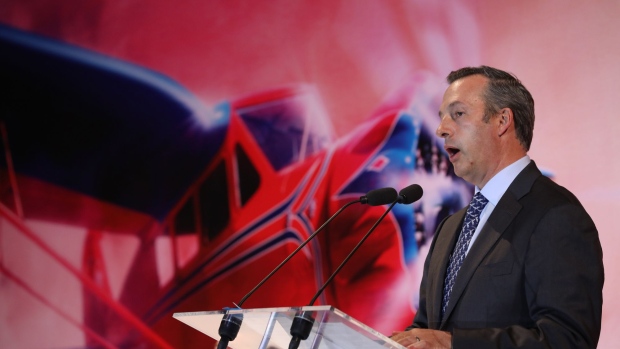Aug 1, 2019
Airbus and Embraer to Face Off for Aeromexico’s Small-Jet Deal
, Bloomberg News

(Bloomberg) -- Grupo Aeromexico SAB is readying itself for a shopping spree to update its fleet of short-haul jets.
Mexico’s sole legacy carrier is poised to choose this year between Embraer SA E195-E2 aircraft and Airbus SE A220 models, Chief Executive Officer Andres Conesa said. The order would potentially be for 60 planes to overhaul the existing regional fleet of Embraer jets, he said. Based on list prices, that implies a deal size of $4.25 billion to $4.9 billion before customary discounts.
Aeromexico, which has been studying the potential order since 2017, is looking to acquire bigger short-distance aircraft in an effort to increase capacity at Mexico City’s congested airport without adding flights. The E195-E2 would boost seat capacity by about 25% compared with the airline’s existing fleet, while the A220 would provide a 35% increase, Conesa said.
“The lack of infrastructure hinders our ability to have more operations,” he said in an interview at Bloomberg’s offices in Mexico City. “The only possibility to grow is to have a fleet up-gauge” by adding bigger planes.
Boeing Family
Aeromexico also flies Boeing 737 planes, including the Max model that was grounded in March after two deadly crashes in five months. The Mexico City-based carrier also operates the 787 Dreamliner aircraft, and Conesa said having only three aircraft types helps limit training costs and increases efficiency.
“Simplicity is key,” he said. “Aeromexico used to have a smaller fleet and eight different cabins -- we had an air show here.”
Sticking with Embraer would mean drawing even closer to Boeing. The Chicago-based planemaker is in the process of taking control of the commercial-aircraft operations of its Brazilian counterpart. Delta Air Lines Inc., which owns a 49% stake in Aeromexico, operates the A220 as well as Embraer planes.
While Conesa said the Max grounding hasn’t soured Aeromexico’s longstanding ties with Boeing, the airline is seeking financial compensation. The amount will probably be finalized when the flying ban is lifted.
Conesa reaffirmed that he expects the Max to return to the skies in November, while cautioning that the timetable could change. Southwest Airlines Co., the model’s biggest operator, and Air Canada recently removed the Max from their flight schedules through early January.
Aeromexico had six Max models when the grounding began in March, and had been expecting delivery of another seven this year. The carrier has an order for as many as 90 of the jets.
The airline, which competes with domestic rivals that primarily use Airbus jets, recently reduced its 2019 forecast for capacity growth because of the weaker Mexican economy and the impact of the Max grounding. Conesa said third-quarter results are shaping up to be stronger.
Aeromexico shares have lost almost a third of their value this year, while Mexico’s benchmark IPC index has only fallen 2%. The carrier was little changed at 15.09 pesos at 11:08 a.m. in Mexico City.
Trans-Atlantic Ties
Aeromexico’s joint venture with Delta has been working well, Conesa said. The Atlanta-based carrier is barred by Mexican law from adding to its stake in Aeromexico.
The Mexican carrier is instead looking to expand on another front, Conesa said, through Delta’s joint venture in the North Atlantic region with Air France-KLM and Virgin Atlantic Airways Ltd., which allows the airlines to coordinate timetables and fares on some routes. Mexican territory is included in that alliance but Aeromexico isn’t, Conesa said.
“We’d like it and we’re working on being part of that,“ he said. “That’s one thing that we can do soon.”
To contact the reporter on this story: Andrea Navarro in Mexico City at anavarro30@bloomberg.net
To contact the editors responsible for this story: Brendan Case at bcase4@bloomberg.net, Jonathan Roeder
©2019 Bloomberg L.P.